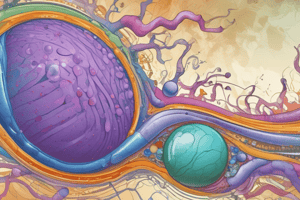Podcast
Questions and Answers
Physiology is the study of the normal function of ______
Physiology is the study of the normal function of ______
cell, tissue, organs, systems and organisms
Systemic physiology is the study of ______
Systemic physiology is the study of ______
system
Pathological physiology is the study of the effect of the disease on ______
Pathological physiology is the study of the effect of the disease on ______
cell, tissue, organ and system
Anatomy can be divided into gross and ______ anatomy
Anatomy can be divided into gross and ______ anatomy
Microscopic anatomy includes the study of ______
Microscopic anatomy includes the study of ______
The Integumentary System Functions provides support and protection. Major organs include skin, hair, sweat glands, and ___________.
The Integumentary System Functions provides support and protection. Major organs include skin, hair, sweat glands, and ___________.
The Nervous System Major organs are the Brain, spinal cord, peripheral nerves, and Sense organs. It directs immediate responses to stimuli, coordinates or moderates activities of other organ systems, and provides and interprets sensory information about external conditions. It is the _______ line of defense.
The Nervous System Major organs are the Brain, spinal cord, peripheral nerves, and Sense organs. It directs immediate responses to stimuli, coordinates or moderates activities of other organ systems, and provides and interprets sensory information about external conditions. It is the _______ line of defense.
The Skeletal System Major organs include bones, cartilages, associated ligaments for other tissues, stores calcium and other minerals, and forms blood cells. The Skeletal System provides support for the body and protects internal organs, and it also plays a role in _________.
The Skeletal System Major organs include bones, cartilages, associated ligaments for other tissues, stores calcium and other minerals, and forms blood cells. The Skeletal System provides support for the body and protects internal organs, and it also plays a role in _________.
The Endocrine System Major organs include pituitary gland, thyroid gland, pancreas, adrenal glands, gonads (testes and ovaries), endocrine tissues in other systems. It directs long-term changes in the activities of other organ systems, adjusts metabolic activity and energy use by the body, and controls many structural and functional changes during _________.
The Endocrine System Major organs include pituitary gland, thyroid gland, pancreas, adrenal glands, gonads (testes and ovaries), endocrine tissues in other systems. It directs long-term changes in the activities of other organ systems, adjusts metabolic activity and energy use by the body, and controls many structural and functional changes during _________.
The Muscular System Major organs include skeletal muscles, associated tendons and aponeuroses (tendinous sheets). It provides movement, protection, and support for other tissues, and generates heat that maintains body temperature. It also helps in maintaining the bone marrow temperature. The Muscular System is responsible for generating _________.
The Muscular System Major organs include skeletal muscles, associated tendons and aponeuroses (tendinous sheets). It provides movement, protection, and support for other tissues, and generates heat that maintains body temperature. It also helps in maintaining the bone marrow temperature. The Muscular System is responsible for generating _________.
Which organ system is responsible for producing male sex cells (sperm) and hormones?
Which organ system is responsible for producing male sex cells (sperm) and hormones?
What is the primary function of the Cardiovascular System?
What is the primary function of the Cardiovascular System?
Which body system defends against infection and disease, acting as the second line of defense?
Which body system defends against infection and disease, acting as the second line of defense?
What is the main function of the Digestive System?
What is the main function of the Digestive System?
Which system helps in maintaining calcium levels in the body and forms blood cells?
Which system helps in maintaining calcium levels in the body and forms blood cells?
What is the study of specific organ known as?
What is the study of specific organ known as?
Which level of organization includes protein filaments and chemical/molecular levels?
Which level of organization includes protein filaments and chemical/molecular levels?
What does Systemic anatomy primarily study?
What does Systemic anatomy primarily study?
In microscopic anatomy, what does Histology specifically study?
In microscopic anatomy, what does Histology specifically study?
What is the main function of the Muscular System?
What is the main function of the Muscular System?
Flashcards are hidden until you start studying




